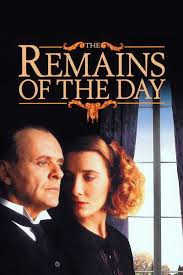Kazuo Ishiguro: Keep Calm and Write On
 I’m thinking of two movies I thoroughly admired. One of them, a sumptuous Merchant-Ivory costume drama from 1993, was nominated for eight Oscars, but had the bad luck to go up against Schindler’s List. The other, featuring three rising young English actors, garnered some critical raves in 2010 for its offbeat storytelling, but was largely overlooked by moviegoers. What do The Remains of the Day and Never Let Me Go have in common? Both are based on novels by the world’s newest Nobel laureate for literature, Kazuo Ishiguro.
I’m thinking of two movies I thoroughly admired. One of them, a sumptuous Merchant-Ivory costume drama from 1993, was nominated for eight Oscars, but had the bad luck to go up against Schindler’s List. The other, featuring three rising young English actors, garnered some critical raves in 2010 for its offbeat storytelling, but was largely overlooked by moviegoers. What do The Remains of the Day and Never Let Me Go have in common? Both are based on novels by the world’s newest Nobel laureate for literature, Kazuo Ishiguro.When The Remains of the Day first crossed my radar, I was surprised by the name of its author. This classic story of a butler (Anthony Hopkins in the film) devotedly serving the lord of a English manor without ever stopping to question his master’s tainted values seemed about as British as tea and crumpets. So why did the novelist have such a Japanese name?
As it turns out, Ishiguro is fully Japanese by birth. Born in Nagasaki, he moved to England with his family at age five because his father was doing research at Britain’s National Institute of Oceanography. Somehow, they never quite left. Although he grew up in a thoroughly Japanese household, young Kazuo attended English schools, ultimately graduating from the University of Kent with an honors degree in English and Philosophy. Along the way, he certainly immersed himself in the strictures of British mores and manners, as his novels reveal. By the same token, Ishiguro’s transformation into an Englishman (he became a British subject in 1982) was accelerated by the fact that Japan and England share a number of cultural values. Both are island nations that have long depended on a sense of hierarchy, with those on society’s lower rungs expected to be quietly deferential to their superiors. Both countries also prize the ability to restrain one’s emotions: what Brits call “stiff upper lip” helps to define the butler’s inability to share his emotions with the housekeeper (the film’s Emma Thompson) who hopes to win his love.
The screen version of The Remains of the Day apparently had its problems. Mike Nichols was slated to direct, from a script by playwright (and Nobel laureate) Harold Pinter. But when producer Ishmail Merchant and director James Ivory took over, the storyline began to evolve, and Pinter chose to remove his name. I can only say that the result is classy in every respect, a true example of what this team could do when let loose among the stately homes of England.
If The Remains of the Day reflects the values of England’s past, Never Let Me Go hints at the nation’s potentially dark future. What starts as a conventional story of three young people in a classic English boarding school takes an ominous turn as we move in the direction of dystopian science fiction. For this attractive trio (played in the film by Carey Mulligan, Andrew Garfield, and Keira Knightly) are not exactly human beings. Rather, they serve humans in a way that shocks us, and makes for a love story with a poignant ending. Once again, unspoken passion seems to be the watchword, connecting this film with Ishiguro’s most famous earlier effort.
The choice of Ishiguro as a Nobel laureate is far less bold and controversial than last year’s selection of Bob Dylan. But he’s a major talent, and I’m sure both Britain and Japan are celebrating. At a time when immigration is coming to be an ugly word, it’s also nice to see how someone who blends two cultures can rise so dramatically to the top of the heap.
Published on October 13, 2017 10:41
No comments have been added yet.
Beverly in Movieland
I write twice weekly, covering topics relating to movies, moviemaking, and growing up Hollywood-adjacent. I believe that movies can change lives, and I'm always happy to hear from readers who'd like t
I write twice weekly, covering topics relating to movies, moviemaking, and growing up Hollywood-adjacent. I believe that movies can change lives, and I'm always happy to hear from readers who'd like to discuss that point.
...more
- Beverly Gray's profile
- 10 followers



